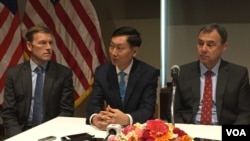Cambodia has said it expects to be able to move from importing nearly all of its electricity from neighboring countries to a net electricity exporter by 2030.
Victor Jona, director general of the Ministry of Mines and Energy, told reporters on Wednesday that Cambodia’s major hydropower projects, such as the Lower Sesan II, and coal-fired power plants meant the country could be in a position to sell electricity to Mekong countries in the near future.
“In the past, we thought that having relied on energy imports for 80 percent of our needs was too much. But from now until the future by [2030], we expect and imagine that we could release our energy back to the region,” he said.
A new project by a Malaysian developer, Cambodian Energy II, for a 135 megawatt coal plant in Preah Sihanouk province will help meet this goal, he said.
The project has seen investment from General Electric, which is building an emissions monitoring system at the plant and supplying equipment, such as turbine systems.
Wouter Van Wersch, CEO and president of General Electric in the Asean region, said the plant would “help reduce Cambodia’s dependence on electricity generated by hydro, and we are very excited to play a role in the rebalancing of the energy base and making this a key pillar for the long-term sustainable growth of the country.”
Cambodia still experiences regular electricity shortages. In 2015, supplies were cut to most of the country due to a technical error in the supply from Vietnam, leading to a public apology from Prime Minister Hun Sen.
William Heidt, U.S. Ambassador, said human rights concerns over the new coal plant had been discussed with the Cambodian authorities ahead of the signing event on Wednesday.
“We handled, we talked with the Cambodian government about human rights issues. We talked with about all sorts of issues. But I think the fact is that it’s now becoming a very interesting market for American companies, and GE’s presence here reflects that,” he said.
Due to the shortage in energy, Cambodia has opened its doors to foreign investors to build large-scale hydropower and coal projects across the country, attracting criticism from environmentalists and human rights campaigners who accuse the developers of a range of crimes, from illegal deforestation to land grabbing.





